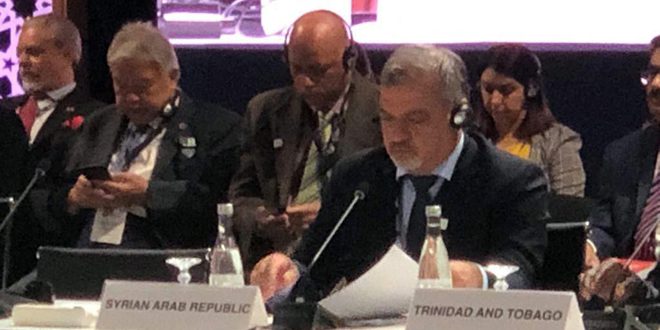Minister Yaghi: International financial institutions must adopt flexible policies towards developing countries
The Syrian delegation continued its participation in the annual meetings of the International Monetary Fund and the World Bank Group in Marrakesh, Morocco, where a meeting was held that included ministers and governors in the Group of 24. During the meeting, Minister of Finance, Dr. Kenan Yaghi, stressed that international financial institutions and developed countries must increase the support provided to developing countries that pay the inflation bill twice.
Minister Yaghi pointed out in his intervention during the meeting that developed countries bear responsibility for the largest part of inflation at the global level, pointing out that this inflation is transmitted to developing countries through the prices of imported goods and services.
Minister Yaghi stated that when developed countries adopt measures to control inflation rates, they raise interest rates and thus raise the cost of global financing and hinder the ability of developing countries to borrow, or at the very least raise the cost of this borrowing. Therefore, international financial institutions must adopt flexible policies towards developing countries and help them grow and support their development efforts.
The G24 statement underlined the need for the International Monetary Fund to reduce the requirements for obtaining financing, especially for the countries most in need, while calling on countries contributing to the Fund with a strong financial position to make additional voluntary contributions.
The statement highlighted the need to increase transparency in the process of selecting and appointing representatives and executive directors in both the International Monetary Fund and the World Bank, with the need to continue reforming the governance frameworks in these two institutions and to give priority to rebalancing power, where emerging market economies and developing economies have a greater role in it.
The statement also stressed the necessity of addressing the issue of sovereign debt, especially in poor countries and fragile economies, and taking the necessary measures to achieve this. It underlined the importance of trade in achieving comprehensive growth and reducing poverty. It referred to the increasing tendency to adopt protectionist policies, especially by advanced economies and the negative impact on food security, investment and trade.
In its statement, the Group of 24 called for a comprehensive reform of the World Trade Organization, ensuring an appropriate and effective role for low- and middle-income countries in the decision-making process within this organization. It emphasized the need to strengthen ties between multilateral institutions and the World Trade Organization, especially in the context of achieving general goals such as those related to sustainable development.
The annual meetings of the International Monetary Fund and the World Bank Group began in Marrakesh, Morocco, on the ninth of this month, with the participation of most member states of these two international institutions, and were concluded today.
It is noteworthy that the International Group of 24 concerned with international monetary affairs and development was established in 1971 as a chapter of the Group of 77 in order to help coordinate the positions of developing countries on international monetary and development financing issues, and to ensure that their interests are adequately represented in negotiations on international monetary issues. Despite originally being named after the number of founding member states, it now includes 28 member states plus China, which serves as a special invitee.
Inas Abdulkareem

